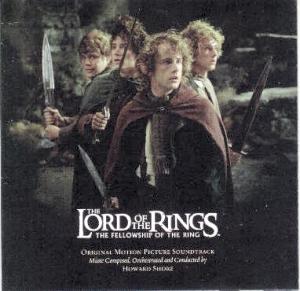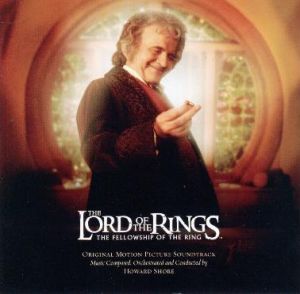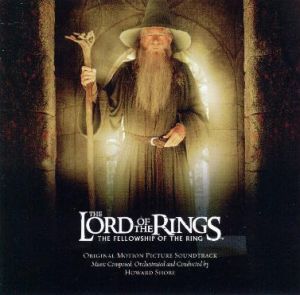************************************************************** RECOMMENDATION January 2002 **************************************************************
Howard SHORE
The Lord of the Rings: The Fellowship of the Ring
Vocal soloist: Enya
OST
REPRISE 9362-48110-2 [71:27]
The score of the year to the film of the year. Need I say more!?
With stygian darkness and monumental beauty, Howard Shore has delivered the music that every Tolkien fan hoped and dreamed of. Right from the initial announcement that Shore would wave the baton on this huge project (as most already know films two and three will eventually follow) I was filled with optimism. He has just the right pedigree to capture the emotion and gravity of this epic tale and his wonderful work on The Fly (1986) and Looking for Richard (1996) in particular gave me a strong sense that he was the right man for this testing task.
The most welcome and striking element of the score itself is the sheer amount of choral work included, but more importantly, it is so diverse and well thought out that it never overpowers that rest of the instrumentation. For instance, the Wagnerian choral motif for the villainous Ringwraiths, heard in pieces such as 'The Black Rider' and 'At The Sign of the Prancing Pony' is full-blooded gothic, whereas 'Lothlorien' has a rather ambient, slightly Middle-Eastern feel (with vocals by Elizabeth Fraser from the band The Cocteau Twins). And of course there is also the Enya material, which thankfully after the initial concerns at her involvement, fits quite nicely (aided and abetted by Shore's orchestration). And for those hoping for a grand thematic work you will not be disappointed. There are major motifs developed subtly and skilfully throughout the score, the two most prominent being the emotive theme for the hobbits themselves (if you don't know what these are, please read the book as soon as possible!), heard to final grand effect with boy soprano vocal on 'The Breaking of the Fellowship' and a stirring theme for the titular fellowship, featured on many cues including 'The Council of Elrond' and 'The Ring Goes South'.
To talk of highlights is like being left alone in a candy store with permission to take what you like and truly this is a score with tremendous depth and scope, but the choral refrain at the conclusion of 'The Treason of Isengard' is certainly stunning and the same can be said for the entirety of 'The Bridge of Khazad-Dum' and I really cannot leave out the thrilling battle music of 'Amon Hen'. But to be truthful there are just so many memorable moments you can take your own pick. It really is that good. But if I were to choose just one for myself, it would be the noble, poignant theme that appears mid-way through 'A Journey in the Dark', which would grace any score with its heart-felt drama and passion. The fact that this melody appears only here and nowhere else may be because this CD only represents an overview of the score and in fact there is twice as much music to be heard in the film itself. Whatever the case, I just hope this is one of the themes that Howard will be developing in films two and three, as it's simply too good to not be used again. And of course, the fact that this is only the first movement of a three part symphonic tour-de-force just makes the whole experience all the more exciting and inspiring.
I just cannot recommend this work highly enough. It simply has everything; heart, glory, majesty and menace and the more you listen to it the better it becomes. A dark masterpiece with the soul of an angel.
Mark Hockley

Ian Lace is not quite so enthusiastic:-
There is no denying that this is a powerful score that will enhance Howard Shore's reputation. It is well crafted and generally I would echo Mark Hockley's comments in his fine review above. The music is awesome and energetic. The choral writing is impressive, vehement in its darker, more gothic moments - reminiscent of Jerry Goldsmith's Omen music – and luminescent in 'Lothlorien', and aspiring in 'The Great River' one of the best cues on the CD. [But the tasteless and risible ugh-ughs in 'The Bridge of Khazad Dunn' should surely have been eliminated from the soundtrack album?] And 'The Breaking of the Fellowship' is a touching conclusion gathering the themes in moving pathos.
On the debit side there is a lot that is derivative in this score and rather too much of the usual Shore tedious thumpings and bangings. In some respects, by the end of its 71 minutes this album has begun to outstay its welcome. When will soundtrack album producers realise that little is often more!
I think the music will probably fit well with the film. I wonder, however, about the danger of subliminal associations and preconceptions? I mean with such music as the very Irish-sounding material for the Hobbits (not to mention Scottish stuff, at points, in the 'Council of Elrond'), never mind the Middle-Eastern-sounding figures that permeate cues like 'The Shadow of the Past' and destabilise the beauty of 'Lothlorien'.
The ethereal music for Aragorn and Arwen in 'The Council of Elron' is suitably pure and sung chastely by Elron but it does not touch the heart. Shore's main theme in this score is quite good but it's the sort that seems to be too much of a composite of what you've heard before and its impact, even in its full flowering, such as in 'The Ring Goes South' is, for me, limited. And I think this is where the trouble lies this score does not touch the heart, it does not send the spirit soaring as so many John Williams scores have done. And this of all stories needs this quality in its music. I wonder if we will regard the Ring Trilogy music with the same affection in ten years time as we hold that for John William's Star Wars? As much as I would have liked to have done, I cannot, in all good conscience, make this my Editor's Choice this month.
Ian Lace

Jeffrey Wheeler says:-
Howard Shore's "The Lord of the Rings: The Fellowship of the Ring" is loud, varied, a perfect cinematic match, yet adds nothing by way of new or classic material. It has an endearing simplicity that falls just on the right side of cliché, and a couple of moments possess a gracefulness that may make a listener misty-eyed. It tops off a better year for filmusic than 2000 ever was. But when Shore leans on his choral hysterics -- which are enough to rival the human sacrifice tracks from "Indiana Jones and the Temple of Doom" -- the bombastic chants threaten to push the music into the realm of parody. Like a good half-dozen or so others this year, this score is a big, predictable 'almost.'
Jeffrey Wheeler

Gary Dalkin adds:-
Considering Howard Shore’s deep involvement with the making of Peter Jackson’s Lord of the Rings trilogy many have anticipated a film music masterpiece to result, and have perhaps let their assumptions close their ears to the reality. I have not yet seen the film, but the soundtrack album plays like nothing so much as a typically well-crafted action blockbuster score. There is a decided lack of any really strong and memorable heroic main theme, while it is rather unsettling to hear a decidedly close cousin of Anakin’s Theme from The Phantom Menace run through several cues on the disc, particularly given the obvious parallels between the Star Wars and Lord of the Rings productions. I am also disturbed to find that culturally the music is simply wrong. In the same way JK Rowling insisted on a completely British cast for the Harry Potter movies yet failed to understand an American director and composer would give the films an unwelcome Hollywood look and sound – John Williams’ score makes for an enjoyable album but a largely inappropriate accompaniment to the adventures of young Mr Potter – New Zealander Peter Jackson seems in hiring an American composer to have little grasp of the essential Englishness of The Lord of the Rings. The attractive though clichéd Irish folk style melody used for the Hobbits is as out of place as James Horner’s cod-Celtic Titanic – any folk elements should be within the English tradition explored by Vaughan Williams and others – while the inclusion of two songs by Enya, complete with her typical electronically reverberated production is risible in a film of this nature. Likewise the use of Arabic musical elements in "Lothlorien" has no place in describing an Elven world firmly within the Northern European mythic tradition, and as for the blatantly obvious Maori "grunting" in "The Bridge at Khazad Dum", well its inappropriateness simply beggars belief.
If my criticism seem harsh it is because this film has so far met with virtually unqualified praise, already topping the Internet Movie Database with a 9.4 rating as presumably the greatest film ever made! It therefore needs to be an absolute masterpiece, perfect in the tiniest details with a score to stand beside Gone With the Wind, Ben-Hur and The Empire Strikes Back . The slapdash approach to mixing inappropriate and/or clichéd musical elements alongside much perfectly adequate though barely memorable orchestral/choral action and suspense writing suggests this is far from the case. Imagine what a composer steeped in the English tradition, a composer such as Richard Rodney Bennett, Patrick Doyle, George Fenton or Stephen Warbeck could have brought to this project, and mourn as massively lost opportunity.
Gary S. Dalkin

Review of the Film:-
The Lord of the Rings: The Fellowship of the RingDIRECTOR PETER JACKSON * SCREENPLAY FRAN WALSH & PHILIPPA BOYENS & PETER JACKSON * PRODUCER BARRIE M. OSBORNE, TIM SANDERS, PETER JACKSON * DIRECTOR OF PHOGRAPHY ANDREW LESNIE * MUSIC HOWARD SHORE
STARRING ELIJAH WOOD, IAN McKELLEN, VIGGO MORTENSON, SEAN BEAN, SEAN ASTIN, CHRISTOPHER LEE, ORLANDO BLOOM, JOHN RHYS DAVIES, IAN HOLM, DOMINIC MONAGHAN, BILLY BOYD, LIV TYLER, HUGO WEAVING, CATE BLANCHETT
I think I can safely assume that by now most readers will know the basic outline of J.R.R. Tolkien's famous story, so I won't bore you with yet another synopsis. It is enough to say that it concerns an epic battle between the forces of good and evil played out against the sweeping backdrop of the mythical setting of Middle-Earth.
So let's quickly get to the most important question. Is it any good? Thankfully, the answer is a definite yes. But does it live up to the hype? Absolutely. Truly there is much to praise and very little to complain about. Tolkien purists on the other hand will balk at the many alterations and cuts made to the story. They will also argue about the interpretation of many scenes (Galadriel's role for instance), but ultimately nothing can be done to appease them if that is their viewpoint. This film is for everyone, not just devotees. It takes Tolkien's work and breathes cinematic life into it.
One of the major pluses is the quality of the acting. It is uniformly superb. Even so, I have to single out several cast members for particular praise. Most notably Ian McKellen, whose performance embodies both compassion and power, humour and gravity. He simply is Gandalf brought to glorious life. No-one could have been better. Elijah Wood as the ring bearer Frodo makes you empathise about not only his plight, but those around him. He is the soul of this story. Sean Bean is an actor whose work I have never really enjoyed. Here though, as the conflicted warrior Boromir, he is extraordinary. A revelation. The same can be said for Viggo Mortenson. He makes the role of Aragorn/Strider his own. Most everyone else has wonderful moments; Ian Holm as Frodo's Uncle Bilbo, struggling against the lure of the One Ring, Christopher Lee as the corrupted wizard Saruman, Orlando Bloom as the cool and deadly elf, Legolas, Sean Astin as Frodo's faithful friend Sam, even Liv Tyler, for so long a great fear to those following the production, gives a fine performance as the elf princess Arwen.
Just as important as the acting are the words they utter and here is one of the many great strengths that this film possesses. Intelligent, articulate dialogue. Scarce in any genre, but a positive rarity in the realm of film fantasy. Kudos must go to the screenwriters Fran Walsh, Philippa Boyens and Peter Jackson. And of course in mentioning Mr. Jackson's name, enormous personal credit must be given to him in his role as director for not only showing great courage to tackle this daunting project, but for having the imagination, talent and belief to put his own distinctive stamp on it.
One very minor note of criticism. I think it might have been beneficial to have made some mention of the fact that this is only the first part of a continuing saga at the film's conclusion. Several members of the audience were heard to question why the story ended on such an abrupt, inconclusive note. Thankfully, we can all rejoice in the expectation of two more already filmed instalments to follow, although next Christmas, when The Two Towers is set to be released, seems a very long wait indeed.
Finally, let me make special mention of Howard Shore's music. His work here supports and enhances the images in such a variety of telling ways that there is little point in speaking of individual moments. It is a tour-de-force. If I was going to nit-pick (and join the Tolkien purists!) it would be to rue the loss of subtle nuances heard on the soundtrack CD which are either lost beneath the other sound effects or edited out. The CD is a representation of the score (and a most excellent one I should add), but having become so familiar with it, I found it slightly jarring when the music didn't play as I expected and the continuity was altered, most notably in 'The Bridge of Khazad Dum' and 'The Breaking of the Fellowship'. Even so, most of the key musical elements feature prominently and the score makes a lasting impression and in many places it transforms the visuals into something transcendental, the kind of awe-inspiring marriage of art forms that we fans of cinema hope and dream of.
The Fellowship of the Ring is not the book. It never could be. But is that such a terrible thing? Film and the written word are two separate mediums. To translate what exists in a myriad of forms in the minds of each individual reader into something tangible and three-dimensional is an incredibly challenging enterprise and yet to my mind Peter Jackson and his collaborators have succeeded where so many have failed before. This is a film that holds true to the spirit of Tolkien's story, condensing yes, abbreviating certainly, but never losing sight of the heart of the tale. And there is the most crucial single element that makes this film such a resounding triumph. Heart. This is far beyond everything else that has come before in this genre, putting to shame the bland, inaneness of Willow (1988) or the simple-minded Krull (1983) or even the far better but severely flawed fairy tale world of Legend (1986). This film has little to do with any of these. It is new. It is something we haven't seen before. At last, after a very long wait indeed, fantasy is treated with real integrity and respect. And that's something that really does make my heart glad. As others have said already, this film has more in common with films like Braveheart (1995) and to a lesser extent Gladiator (2000), but I think an even better example would be Michael Mann's version of The Last of the Mohicans (1992). The same passion, intensity and emotion embodies both. But let me make one thing very clear, The Fellowship of the Ring is by far the better film.
Mark Hockley

Return to Index


